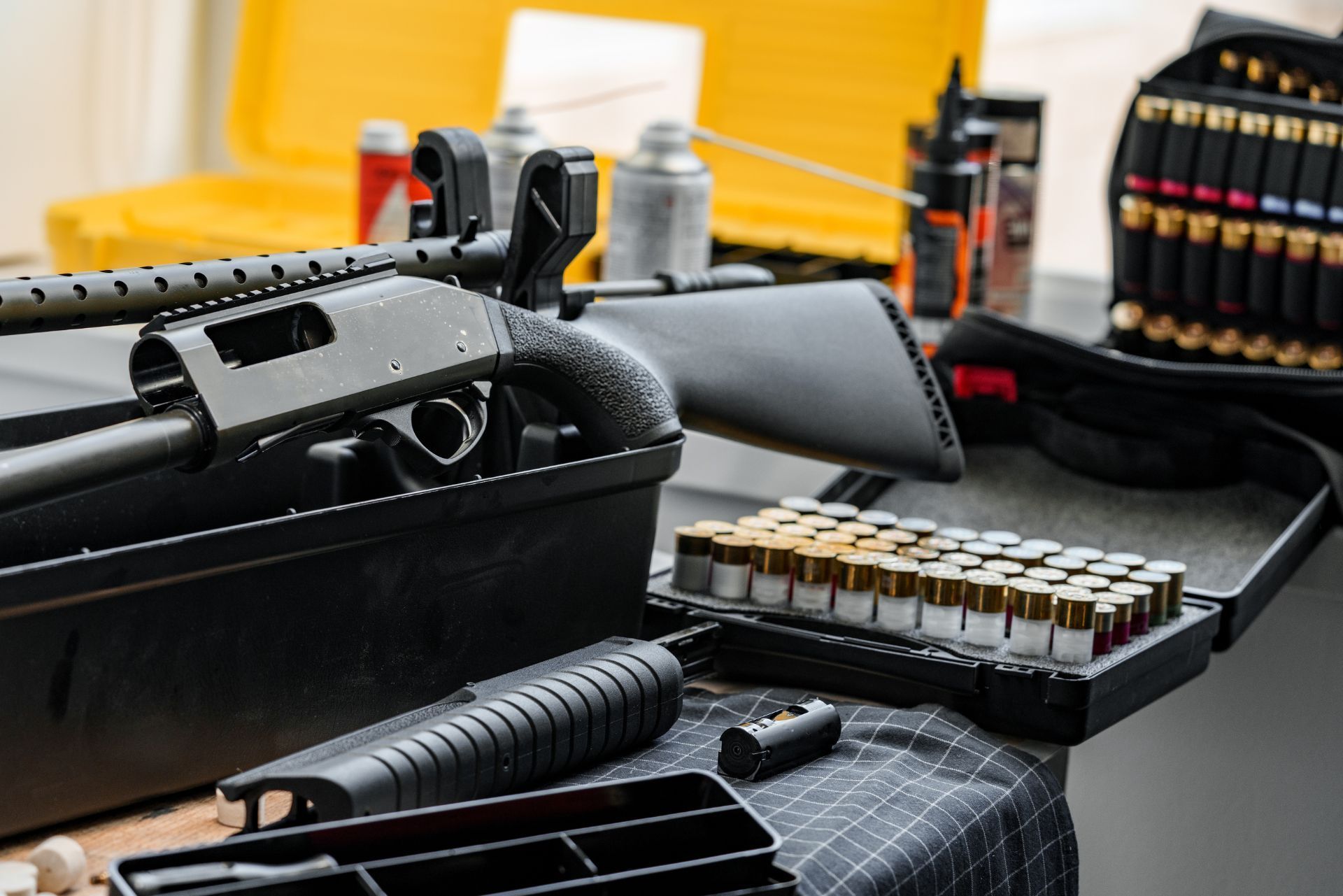Top 3 Recommended Policies

Operating a firearms dealership or gun range in New York comes with unique challenges and responsibilities, especially when it comes to insurance. With approximately 393 million civilian-owned firearms in the U.S., the firearms industry is vast and complex. New York, in particular, has introduced significant regulatory changes that directly impact dealers and range operators. Understanding the nuances of insurance coverage in this environment is crucial for protecting your business, complying with state laws, and managing liability risks effectively.
Understanding the Regulatory Landscape in New York
New York has become one of the most active states in regulating firearms sales and usage. In July 2025, a federal appeals court upheld a New York state law that holds gun manufacturers potentially liable when their weapons are used in deadly shootings. This ruling marks a significant shift in how liability is approached in the firearms industry, emphasizing the importance of comprehensive insurance coverage for dealers and ranges. This legal precedent could pave the way for similar legislation in other states, potentially reshaping the national conversation around gun control and manufacturer accountability.
Additionally, as of January 7, 2025, firearms dealers in New York are mandated to post a warning notice at any site where firearms are sold, displayed, or delivered to purchasers. This requirement is part of a broader effort by the New York State Office of Gun Safety to increase transparency and safety awareness among consumers. The notices are designed to inform potential buyers about the risks associated with firearms ownership and to encourage responsible handling and storage practices, which could ultimately lead to a reduction in accidental discharges and gun-related incidents.
These regulatory developments highlight the evolving legal environment that firearms businesses must navigate. Insurance policies now need to address not only traditional risks like theft or property damage but also emerging liabilities related to product use and compliance with state mandates. Furthermore, the implications of these regulations extend beyond just the legal framework; they also affect the operational procedures of gun dealers and ranges. For instance, training programs for staff may need to be updated to ensure compliance with the new laws, and customer education initiatives may become increasingly important in fostering a culture of safety. As the landscape continues to evolve, stakeholders in the firearms industry must remain vigilant and adaptable, ensuring they not only meet regulatory requirements but also contribute to a safer community.

Key Insurance Considerations for Firearms Dealers
Firearms dealers face a distinct set of risks that require specialized insurance solutions. Beyond the typical coverage for property and general liability, dealers must consider product liability insurance due to the potential for lawsuits stemming from the use of their firearms. The recent court ruling in New York underscores this need, as manufacturers and dealers could be held accountable for incidents involving their products.
Moreover, the firearms market is known for its challenges, which industry experts have described as "clear and well-documented" across the sector. This includes fluctuating demand, regulatory scrutiny, and the inherent risks associated with handling firearms. Insurance providers often tailor policies to address these factors, ensuring dealers are protected against financial losses from lawsuits, theft, or operational interruptions. Additionally, the rise of online sales and the increasing complexity of e-commerce regulations add another layer of risk, requiring dealers to ensure their insurance covers digital transactions and the unique liabilities that come with them.
Another critical aspect is compliance with inspection protocols. A study published in Criminology & Public Policy found that only 12% to 40% of gun dealers are inspected by the ATF within a five-year period. While this might suggest limited oversight, dealers should not rely on infrequent inspections to avoid compliance. Insurance companies often require proof of adherence to all federal and state regulations as a condition for coverage. Furthermore, maintaining accurate records and implementing robust inventory management systems can not only help in passing inspections but also serve as a defense in the event of a claim. By demonstrating diligence in compliance, dealers can potentially negotiate better insurance rates and terms, ultimately benefiting their bottom line.
In addition to these considerations, firearms dealers must also be aware of the evolving landscape of gun laws and regulations, which can vary significantly from one jurisdiction to another. This variability can impact everything from the types of firearms that can be sold to the necessary background checks and waiting periods for purchasers. As such, staying informed about local and state legislation is crucial for dealers, not only to remain compliant but also to anticipate changes that could affect their business operations. Insurance providers often look favorably upon dealers who actively engage in legal education and training, as it reflects a commitment to responsible business practices and risk management.
Insurance Needs for Gun Range Operators
Gun ranges have their own set of insurance requirements, reflecting the unique risks associated with live-fire activities. Liability coverage is paramount, as ranges must protect against accidents involving customers or employees. This includes bodily injury, property damage, and potential claims arising from negligent supervision or unsafe conditions.
Property insurance is equally important, covering damage to the facility, equipment, and firearms. Given the specialized nature of gun ranges, policies may also include coverage for noise pollution or environmental liabilities, depending on the location and operations.
Industry reports, such as the National Shooting Sports Foundation’s 2023 Industry Reference Guide, provide valuable insights into trends in hunting and target shooting activities. These trends influence the demand for gun ranges and, by extension, the types of insurance coverage that are most relevant. As participation in shooting sports evolves, range operators must stay informed to ensure their policies remain adequate.
In addition to liability and property insurance, gun range operators should also consider coverage for business interruption. This type of insurance can provide financial support in the event that the range must temporarily close due to unforeseen circumstances, such as natural disasters or significant accidents. The ability to maintain operational stability during such times is crucial for the long-term viability of the business, allowing operators to manage ongoing expenses even when revenue is disrupted.
Furthermore, specialized coverage options, such as firearms liability insurance, can be beneficial for ranges that offer rental firearms or training courses. This insurance can protect against claims related to the use of these firearms, ensuring that both the range and its customers are safeguarded. As the industry continues to grow and evolve, staying ahead of emerging risks and adapting insurance strategies accordingly will be essential for gun range operators to thrive in a competitive market.
Liability and Risk Management in the Firearms Industry
Liability remains a central concern for both dealers and range operators. The firearms industry is under constant scrutiny, and the legal landscape is shifting. Experts caution against attempts to circumvent federal regulations through state laws, emphasizing that "the intent of Congress when it closes a door is not for States to thus jimmy a window." This perspective, highlighted in the Insurance Journal, stresses the importance of adhering to both federal and state laws to avoid costly legal battles.
Risk management strategies should include thorough employee training, strict adherence to safety protocols, and regular audits of operational practices. Insurance providers often look favorably on businesses that demonstrate proactive risk mitigation, which can lead to more favorable premium rates and coverage terms. Additionally, implementing a comprehensive crisis management plan can further enhance a business's resilience against potential incidents. This plan should outline clear procedures for communication, emergency response, and recovery, ensuring that all employees are well-informed and prepared to act swiftly in the event of an unforeseen situation.
Given that gun-related crimes decreased slightly by 1.4% in 2022 according to ZipDo Education Reports 2025, there is some indication that safety measures and regulations may be having a positive impact. However, the firearms industry must remain vigilant and prepared for any potential liabilities. This vigilance includes staying informed about emerging technologies and trends in firearms safety, such as smart gun technology and enhanced training simulations. By embracing innovation and integrating these advancements into their operations, firearms businesses can not only improve safety but also position themselves as leaders in responsible gun ownership and usage.

Choosing the Right Insurance Provider
Selecting an insurance provider that understands the firearms industry is critical. Not all insurers are equipped to handle the complexities of firearms dealer and gun range insurance. Businesses should seek providers with specialized knowledge and experience in this sector to ensure comprehensive coverage.
When evaluating insurance options, consider the scope of coverage, limits, exclusions, and the insurer’s reputation for handling claims related to firearms. It’s also beneficial to work with brokers or agents who are familiar with New York’s specific regulatory environment.
Given the evolving nature of the firearms market and legal landscape, insurance policies should be reviewed regularly and updated to reflect changes in operations, regulations, and risk profiles. Staying informed through industry reports and expert insights can help businesses anticipate and adapt to these changes effectively.
Additionally, it is important to assess the financial stability of the insurance provider. A company with a strong financial background is more likely to fulfill its obligations in the event of a claim. Look for insurers with high ratings from independent rating agencies, as these ratings can provide insight into their ability to pay claims and their overall reliability. Furthermore, consider the insurer's claims process; a streamlined, transparent claims process can significantly reduce stress during challenging times, allowing business owners to focus on recovery rather than navigating bureaucratic hurdles.
Moreover, engaging with other firearms industry professionals can provide valuable insights into their experiences with various insurance providers. Networking at industry events or joining associations can open doors to recommendations and warnings about specific insurers. Peer feedback can be an invaluable resource when making a decision, as it often highlights strengths and weaknesses that may not be immediately apparent through research alone. By leveraging these connections, businesses can make more informed choices that align with their unique needs and operational goals.
Conclusion
Operating a firearms dealership or gun range in New York requires careful attention to insurance and regulatory compliance. With recent legal developments holding manufacturers and dealers potentially liable for the misuse of firearms, and new state mandates such as warning notices at points of sale, the stakes have never been higher.
Comprehensive insurance coverage tailored to the unique risks of the firearms industry is essential for protecting your business from financial losses and legal challenges. By understanding the regulatory landscape, managing risks proactively, and partnering with knowledgeable insurance providers, firearms dealers and gun range operators can navigate this complex environment with confidence.
For more detailed information on the firearms industry and insurance considerations, resources like the
Shooting Industry Magazine U.S. Firearms Industry Today Report 2025 offer valuable insights into current market challenges and trends.
Contact Us
Phone
Location
